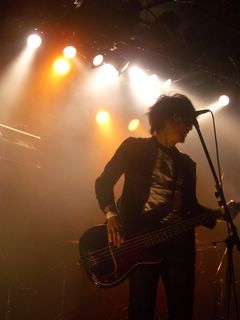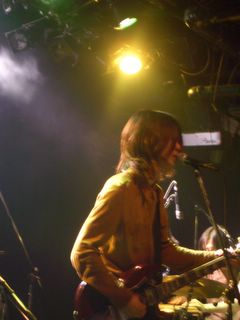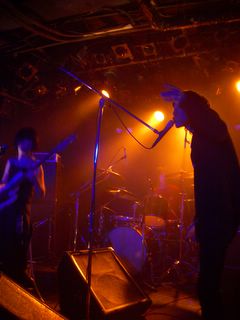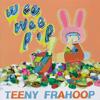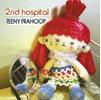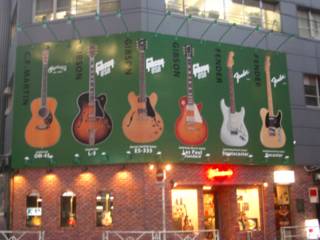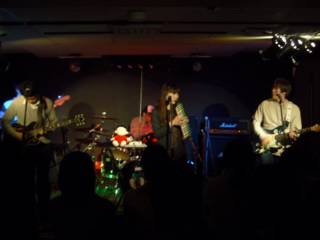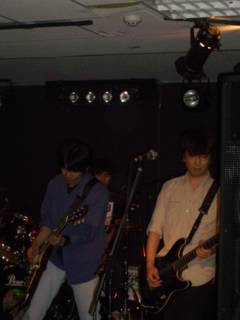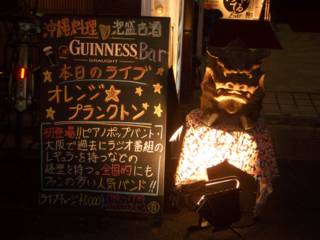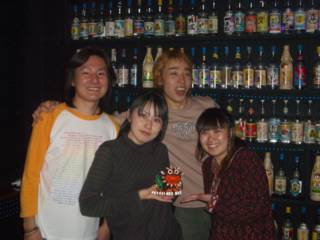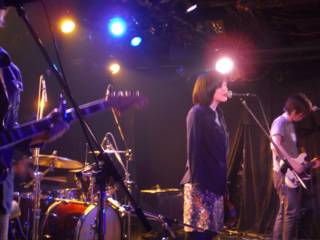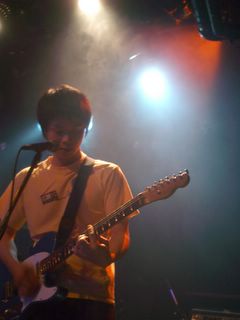
Linus' Blanket's Minsung

One of the greatest trips I ever took in my life happened last March, when I traveled to Seoul to see a musical event called Melody Go Round. Four bands from Japan went to play at this event – advantage Lucy, Plectrum, Miniskirt and Lost in Found – and they were joined by Linus’ Blanket of Korea.
Before the trip, I had pitched a story about this tour to the editors of the Far Eastern Economic Review (FEER), saying the article would deal with the timely topic of improving Japan-Korea relations as seen in their increased pop culture exchange. And it was true: at the start of last year, Korea had lifted a decades-long ban on the sale of Japanese language pop music. There were Koreans who had been following Japanese music on the Internet for years before the ban was lifted, but how do those Korean fans square their love for Japan’s music with their feelings about Japan’s dark WWII and pre-war past? That's what my story would ask, I told the editors. They went for it. Make it an atmospheric rock journalism yarn, sort of like Almost Famous, one of them said.
If you find a stack of FEER’s in your dentist’s office or local library and see an issue with a cover illustration of Kim Jongil counting dollar bills, that’s the one, my article is inside.
But despite the serious theme I was meant to write about, what I was really interested in was seeing up close and in action the Japanese bands going to Seoul. I’d already been listening to advantage Lucy for years by the time this trip was announced, and I had also recently discovered the other bands. I wanted to know what these musicians were like in person.
It turned out that they were nice, ordinary people. But at the same time they were the creators of great music that was constantly in the background in my life. It was a huge thrill to get to know them for the first time, especially members of advantage Lucy.
Equally touching was the rock star-like enthusiasm the Korean fans showed to the Japanese bands. The bands, who had no idea how the Korean audience would respond to them, were greeted with packed club halls filled with the most passionate fans a musician could ask for. It was moving to see Korean fans go crazy about foreign musicians who they couldn’t even have conversations with and were mostly seeing for the first time, loving them for their music alone.
***
Anyway, to get to the point of this post, Seoul’s Linus’ Blanket flew to Tokyo to participate in a second Melody Go Round with the four Japanese groups. I didn’t expect this latest event, on Saturday night, to be quite as fantastic as the Seoul show last March, and it wasn’t. Still, if it wasn’t a transforming experience like the last Melody Go Round, it was still a hugely delightful show.
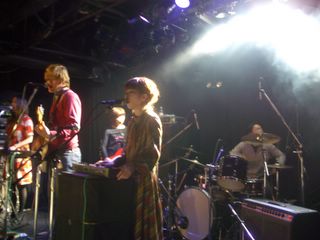
Lost in Found

Up first was Lost in Found. They’ve always played nice melodies, but they’d gotten much better live in the year since the Seoul show. This was the second to last time that lead guitarist Taisuke Saito played for them.
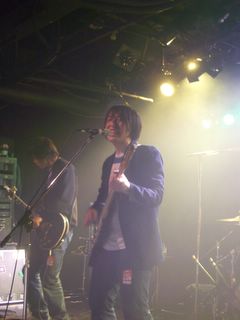
Plectrum

Next up was Plectrum. I’ve seen the rock quartet play in Seoul at four shows and each time they knocked out the audience. After their first Seoul trip, a group of Koreans who saw them play was so struck by the performance that they decided to form a fan club soon afterwards. I’ve never seen a Plectrum show that as anything but outstanding, and tonight was no exception. Next month they are due to release a live album, which should be excellent.
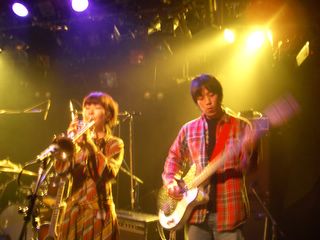
Lost in Found's Yukiko with Plectrum's Kicchon.

Band #3 was Miniskirt, whose singer, a German named Edgar Franz, organized the show. They were good, and had gone multi-media. A projector on one side of the stage beamed pictures onto the back wall, and in the middle of the show a tall foreigner in an African-looking robe climbed on stage and did interpretive dances of Miniskirt tunes.
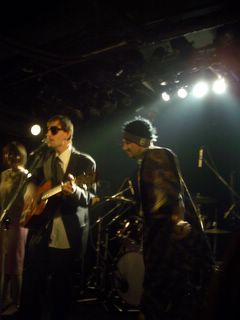
Miniskirt, with dancer.

The fourth band was advantage Lucy. Their guitarist, Yoshiharu Ishizaka, had found an unusual guitar in the home of Takayuki Fukumura – a Fender Musicmaster. An old student-model electric guitar that you don’t often see on sale, the Musicmaster had a simple tone that Ishizaka liked, so he borrowed it from Fukumura-kun’s house to play tonight. But it being an old guitar, Ishizaka said he struggled to keep it in tune during the performance. Whether that was the case, advantage Lucy’s show was spectacular as always.
Between songs, singer Aiko said to Ishizaka, "You know that floating feeling you get after you perform a good song, or listen to good music?"
Ishizaka said yeah.
Aiko says, "That’s how I was feeling, until I looked over at the keyboard and saw a pile of bills on top of it. That brought me back down right away to the real world."
The bills, totaling 6,000 yen, was Ishizaka’s, and he said he had the money in his pocket because he no longer uses a wallet but when he searched in his pocket for a guitar pick the bills got in the way, so he left it on the keyboard. "It’s sad it’s only 6,000 yen I have," he said (that’s about $60).
Very advantage Lucy. Gorgeous and intense music followed by hapless talk.
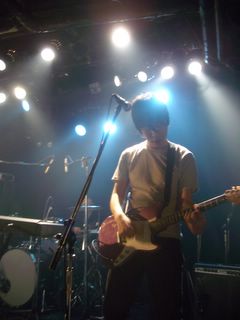
advantage Lucy's Ishizaka playing Fender Musicmaster.

Another thing that was very advantage Lucy – before the show Linus’ Blanket bassist Wonyul and I ran into Aiko and Ishizaka, riding bicycles to the Club Que, greeting acquaintances on the way and smiling brightly.
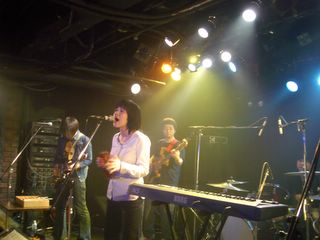
advantage Lucy

The final act of the night was Linus’ Blanket from Seoul. The crowd loved their classy pop sound, and erupted in cheers after each song, something you don’t hear that often at these types of shows (scattered clapping is more the norm). Everything about the band is cute and delicate, as when singer Gene plays her tiny finger cymbals.
Yet at the end of the show, Gene did something that was gutsy rather than delicate.
When the band finished their last song, the audience clapped for an encore and the Linus guys returned to the stage, but it was around 10 at night and the club had to to clear the hall to get ready for a midnight show next and so the show had to end. Linus’ guitar player Kang Minsung, who speaks Japanese, explained sadly to the audience that their time was up, so he didn’t think they could play another song. He then stammered. The audience was silent, understanding that Minsung was in a bind, wanting to play more and knowing the audience wanted to hear more, but also feeling the club’s schedule should be respected.
That’s when Gene decided to take matters into her own hands. She begged the club to let them play just a short tune, and then said, "Tasukete!", or ‘help me’ in Japanese. The crowd came back to life and clapped, and the hall became filled with applause. Now, when a cute singer from abroad is begging help to be allowed to play an encore and the crowd is clapping loudly in response, would any good club refuse to let a band play? I don’t think so. That wouldn’t be Show Business at all. So, by getting the crowd on her side Gene was able to get the OK to play one final song, and it was a nice one.
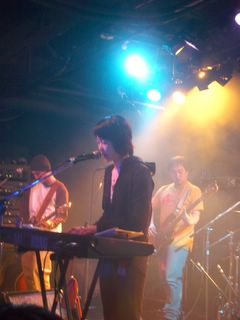
Linus' Blanket at the Que.


